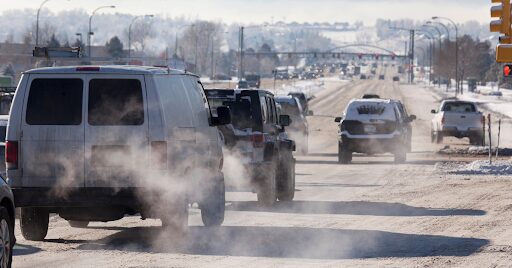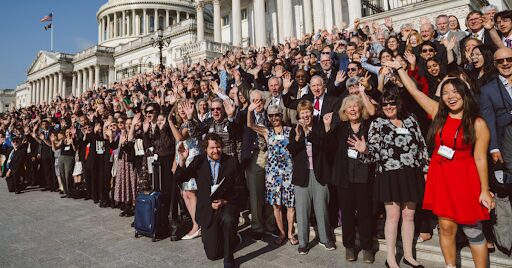
By Elissa Tennant
From power plants and refineries to the highways and homes in our communities, fossil fuel pollution reaches into every corner of our lives. While oil, coal, and natural gas have fueled industries and driven economies since the 1800s, they also release pollutants that directly impact the health of people and the planet.
According to the U.S. Energy Information Administration, fossil fuels make up about 79% of total U.S. primary energy production in 2022. While they’ve powered our progress to this point, it’s way past time to shift to cleaner alternatives.
The Price of Power: Pollution at the Source
When fossil fuels are burned for energy, they release a variety of harmful substances into the air and water. Major sources like power plants and oil refineries emit pollutants such as sulfur dioxide, nitrogen oxides, and particulate matter, all of which have been linked to respiratory issues, cardiovascular disease, and cancer. But the pollution from these facilities doesn’t just affect the environment; it impacts the people who live nearby, particularly those in frontline communities—areas located close to major industrial sites.
People in frontline communities often face higher rates of health complications due to their proximity to these sources of pollution. Many of these communities also experience social and economic challenges that limit their ability to relocate or advocate effectively for cleaner air and water. The effects of pollution can accumulate over time, leading to chronic illnesses and decreased quality of life for individuals living near these energy production sites. It’s a cycle of harm that disproportionately affects vulnerable populations.
The Impact of Fossil Fuels: Pollution in Our Everyday Lives
Fossil fuel pollution doesn’t stop at the point of creation. Many of us are exposed to pollutants every day in our communities, and even in our homes.
Air Contamination from Fossil Fuel Pollution
People living near major highways or in densely populated urban areas are frequently exposed to exhaust emissions from cars and trucks, which release carbon monoxide, nitrogen dioxide, and fine particulate matter. These pollutants contribute to smog, reduce air quality, and can lead to asthma, bronchitis, and other respiratory issues.

Inside our homes, fossil fuel powered appliances create air pollution that contributes to serious respiratory problems like asthma, particularly in children. Natural gas used for cooking, heating, and water heating can be a hidden source of air pollution. When natural gas appliances are used without proper ventilation, they release nitrogen dioxide and carbon monoxide, which can exacerbate respiratory conditions and contribute to poor indoor air quality.
Air pollution is often invisible, but its health impacts are very real, and even worse than we originally thought. New research shows that premature deaths in America each year due to air pollution are nearly twice as high as previously understood. As many as 1 in 10 American deaths today is caused by air pollution.
Water Contamination from Fossil Fuel Pollution
Air pollution from fossil fuels often overshadows the impact on our water systems, but contamination of rivers, lakes, and groundwater can be just as harmful. Oil spills and runoff from coal mining and fracking are just a few ways fossil fuels contaminate our water sources. Toxic substances such as heavy metals and chemicals used in fossil fuel extraction can seep into water supplies, affecting not only wildlife but also human populations that rely on these sources for drinking water.
The damage extends beyond immediate contamination, as pollutants can linger in water systems for years, affecting ecosystems and contributing to the long-term degradation of water quality. In communities that depend on local water sources, this pollution can lead to serious health risks, including neurological and developmental disorders in children, reproductive health issues, and other long-term health complications.
How You Can Make a Difference
Fossil fuels and pollution don’t just contribute to climate change; they impact public health, disproportionately harm vulnerable communities, and degrade our natural resources. But there’s good news: we have the power to create change. By reducing our reliance on fossil fuels and moving toward clean, safe energy sources, we can lessen these impacts and pave the way toward a healthier future for everyone.
Many people strongly believe that we as individuals need to solve the problem. While every bit helps, we can’t solve our dependence on fossil fuels alone. We need to work together to pass nationwide policies that make a difference.
We’re already seeing things trend in a positive direction. Existing climate policy, like the Inflation Reduction Act of 2022, could prevent up to 180,000 premature deaths in the U.S. and lower rates of asthma and lung disease over the next decade by cutting air pollution. The cost of solar has fallen by 90% over the last decade, and the cost of wind by 70%. Many countries are also setting ambitious clean energy targets, with the United States promising to reduce emissions by 50% by 2030.
Here are some actions you can take right now to keep the momentum going:
- Talk to people about climate change: Most Americans are worried about climate change, but we tend to think we’re alone. We need to break out of our bubbles and talk to friends and family about climate change. The more we talk about it, the more real it feels and the more our elected representatives hear that it’s a serious problem.
- Support clean energy policies: At all levels of government, legislators are working on initiatives to reduce fossil fuels and pollution and promote renewable energy. By supporting these policies and encouraging representatives to prioritize clean energy, you can help shift our society away from fossil fuel dependence.
- Volunteer: There are hundreds of organizations in the United States that promote clean air, water, and renewable energy. Check out our friends at Moms Clean Air Force, Rewiring America, and Dream.org, just to name a few. You can also volunteer with us, Citizens’ Climate Lobby (CCL)!

At CCL, we empower everyday people to advocate for policies that reduce pollution and promote sustainability. Our nonpartisan approach is all about creating a livable future by working with our communities and policymakers to pass effective climate solutions.
If you’re interested in combating the role of fossil fuels and pollution in climate change and advocating for a healthier planet, consider joining us. Together, we can build a future where communities thrive and the air and water we depend on are safe for all.

